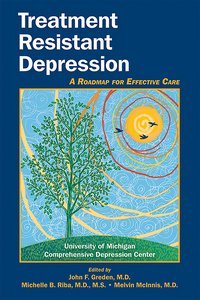Treatment Resistant Depression
A Roadmap for Effective Care
View Pricing
Description
As many as 35-40% of patients afflicted with Major Depressive Disorder (MDD) are treatment resistant, a situation that places a massive emotional and financial burden on society and challenges the mental health profession to develop new treatment paradigms and practices. Even the most astute clinicians can be frustrated when treatment options fail to be effective or work for only a brief time, leaving them to wonder what course to pursue next. Treatment Resistant Depression: A Roadmap for Effective Care gives clinicians and their patients what they need most desperately: a sequence of steps that reflect state-of-the-art diagnostic procedures and integrates all evidence-based treatment modalities—in short, a roadmap to wellness and recovery.
Based primarily on the experiences of the authors, all of whom are leading researchers and/or clinicians in Treatment Resistant Depression and affiliated with the University of Michigan Comprehensive Depression Center, the book also draws upon the clinical research advances and treatment innovations of programs around the world. Although the book's step-by-step organization is clear and easy to follow, its coverage, scope, and level of sophistication are anything but simplified. This book
- Is comprehensive, addressing treatment options, including psychopharmacotherapy, psychotherapy, neuromodulation (ECT, transcranial magnetic stimulation, deep brain stimulation, vagus nerve stimulation), exercise, nutrition, self-management approaches to enhance adherence, behavioral sleep programs, and others
- Addresses treatment resistant depression across the lifespan, reflecting the diverse demographics of depression, which knows no age, gender, or socioeconomic status
- Emphasizes the authors' commitment to early intervention and provides techniques for identifying young people who are at risk for developing depression or already expressing symptoms of the disease
- Recognizes the chronicity of depression, rather than focusing on only the acute stage, and in this way allows for more effective treatment over the patient's lifetime
- Introduces self-management as playing a critical role in the patient's prognosis, engagement, adherence to clinical steps that help maintain recovery, and self-esteem
- Promotes the development of new, personalized, and predictive biomarkers to target treatment more effectively.
Designed to be useful across disciplines and treatment modalities, the book includes a multitude of tables, graphs, and learning aids that will benefit students, instructors, and clinicians. At the same time, the book promises to be a valuable resource for patients and their families, since Treatment Resistant Depression is both difficult to live with and little understood. No other book offers so much practical guidance, sound research and hope.
Contents
- Contributors
- Disclosure of Interests
- Foreword
- Preface
- Dedication and Acknowledgements
- Chapter 1. Treatment resistant depression: overview of the University of Michigan Depression Center roadmap
- Chapter 2. Psychopharmacological roadmap for treatment resistant depression
- Chapter 3. Treatment resistant depression in adolescents
- Chapter 4. Recognizing and treating depression and bipolar disorder on college campuses: early identification and intervention
- Chapter 5. Treatment resistant depression in pregnant women
- Chapter 6. Treatment resistant depression in later life
- Chapter 7. Treatment resistant depression and comorbid medical problems: Cardiovascular disease nd cancer
- Chapter 8. Alcohol and drug use: Contributions to treatment resistance for patients with depression
- Chapter 9. Sleep and circadian rhythms: A understudied area in treatment resistant depression
- Chapter 10. Psychotherapy strategies for treatment resistant depression
- Chapter 11. Device-related neuromodulation in treatment resistant depression
- Chapter 12. Exercise, nutrition, and treatment resistant depression
- Chapter 13. The bipolar disorder medical care model: A collaborative approach for reducing disparities in medical care among patients with bipolar disorder
- Chapter 14. Expanding services for patients with treatment resistant depression: The role of peer support
- Chapter 15. Genetics of mood disorders: general principles and potential applications for treatment resistant depression
- Index
Contributors
- Iyad Alkhouri, M.D.
Roseanne Armitage, Ph.D.
J. Todd Arnedt, Ph.D.
Virginia Barbosa, M.D.
Kirk J. Brower, M.D.
Paul Burghardt, Ph.D.
Simon Evans, Ph.D.
Heather A. Flynn, Ph.D.
Neera Ghaziuddin, M.D., M.R.C.Psych.
Rachel Lipson Glick, M.D.
Mona Goldman, Ph.D.
David E. Goodrich, M.S., M.A., Ed.D.
John F. Greden, M.D.
Joseph Himle, Ph.D.
Victor Hong, M.D.
Helen C. Kales, M.D.
Masoud Kamali, M.D.
Kevin Kerber, M.D.
Amy M. Kilbourne, Ph.D., M.P.H.
Cheryl King, Ph.D.
Daniel F. Maixner, M.D.
Susan Maixner, M.D.
Sheila M. Marcus, M.D.
Melvin G. McInnis, M.D.
Brian Mickey, M.D., Ph.D.
Erin Miller, M.S.
Maria Muzik, M.D., M.Sc.
John M. Oldham, M.D., M.S.
Parag G. Patil, M.D., Ph.D.
Paul Pfeiffer, M.D., M.S.
Michelle B. Riba, M.D., M.S.
Kathryn Roeder, B.S.
Srijan Sen, M.D., Ph.D.
Todd Sevig, Ph.D.
Lisa S. Seyfried, M.D.
Claire Stano, M.A.
Kiran Taylor, M.D.
Stephan F. Taylor, M.D.
Jamie Travis, B.A.
Marcia Valenstein, M.D., M.S.
Delia Vazquez, M.D.
Heather Walters, M.S.
Robert Winfield, M.D.
Kara Zivin, Ph.D.
About the Authors
John F. Greden, M.D., is Rachel Upjohn Professor of Psychiatry and Clinical Neurosciences, University of Michigan; Executive Director, University of Michigan Comprehensive Depression Center; Research Professor, Molecular and Behavioral Neurosciences Institute; and Chair, National Network of Depression Centers.
Michelle B. Riba, M.D., M.S., is Clinical Professor; Associate Director, Michigan Institute for Clinical and Health Research; Associate Director, University of Michigan Comprehensive Depression Center; Associate Chair for Integrated Medical and Psychiatric Services, University of Michigan, and Past President, American Psychiatric Association.
Melvin G. McInnis, M.D., is Thomas B. and Nancy Upjohn Woodworth Professor of Bipolar Disorder and Depression; Professor of Psychiatry; Associate Director, University of Michigan Comprehensive Depression Center; and Section Director, Depression Center, University of Michigan.
Related Products
Carousel Control - items will scroll by tabbing through them, otherwise arrows can be used to scroll one item at a time








